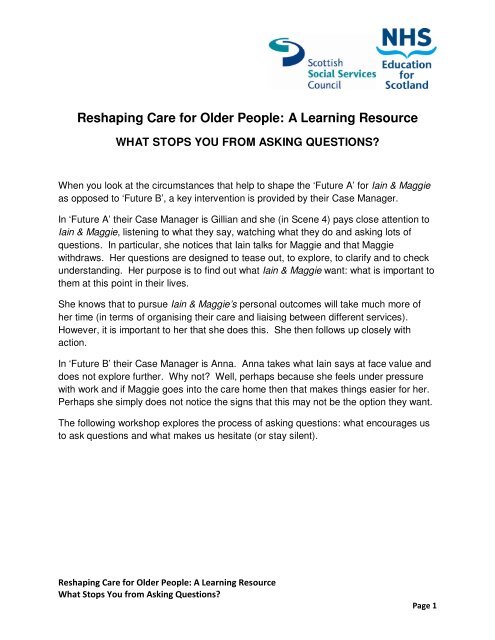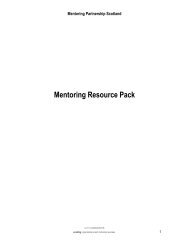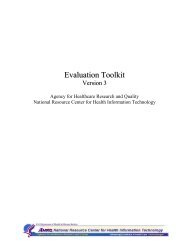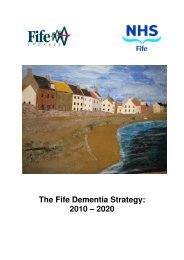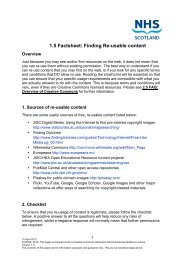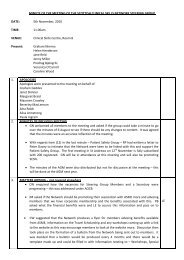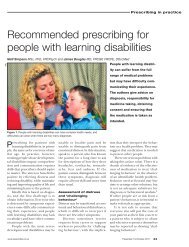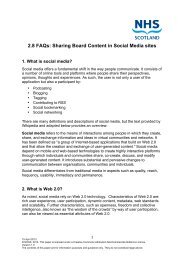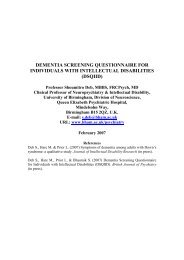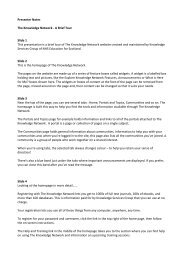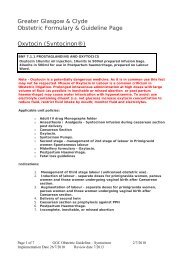What Stops You Asking Questions?
What Stops You Asking Questions?
What Stops You Asking Questions?
You also want an ePaper? Increase the reach of your titles
YUMPU automatically turns print PDFs into web optimized ePapers that Google loves.
Reshaping Care for Older People: A Learning Resource<br />
WHAT STOPS YOU FROM ASKING QUESTIONS?<br />
When you look at the circumstances that help to shape the ‘Future A’ for Iain & Maggie<br />
as opposed to ‘Future B’, a key intervention is provided by their Case Manager.<br />
In ‘Future A’ their Case Manager is Gillian and she (in Scene 4) pays close attention to<br />
Iain & Maggie, listening to what they say, watching what they do and asking lots of<br />
questions. In particular, she notices that Iain talks for Maggie and that Maggie<br />
withdraws. Her questions are designed to tease out, to explore, to clarify and to check<br />
understanding. Her purpose is to find out what Iain & Maggie want: what is important to<br />
them at this point in their lives.<br />
She knows that to pursue Iain & Maggie’s personal outcomes will take much more of<br />
her time (in terms of organising their care and liaising between different services).<br />
However, it is important to her that she does this. She then follows up closely with<br />
action.<br />
In ‘Future B’ their Case Manager is Anna. Anna takes what Iain says at face value and<br />
does not explore further. Why not? Well, perhaps because she feels under pressure<br />
with work and if Maggie goes into the care home then that makes things easier for her.<br />
Perhaps she simply does not notice the signs that this may not be the option they want.<br />
The following workshop explores the process of asking questions: what encourages us<br />
to ask questions and what makes us hesitate (or stay silent).<br />
Reshaping Care for Older People: A Learning Resource<br />
<strong>What</strong> <strong>Stops</strong> <strong>You</strong> from <strong>Asking</strong> <strong>Questions</strong>?<br />
Page 1
Workshop - Introduction 1<br />
This story was told by an elderly woman:<br />
“I had an operation and was in hospital for five days. I thought someone would<br />
think it was important for me to eat. I was really hungry. But I hardly ate a thing.<br />
No-one asked me why.”<br />
This woman’s story raises a fundamental issue about care environments: important<br />
things are missed because people do not ask questions.<br />
The first step is to take notice. In relation to this patient lying in bed, what is happening<br />
to make those staff in the ward not notice that she has eaten nothing? It is fundamental<br />
to us as human beings that we select what to take notice of and what to ignore. If we<br />
tried to pay attention to everything we see, hear, touch, smell and taste, then we would<br />
move at the speed of a snail, never be able to complete any task or make a decision.<br />
So the staff who passed by this patient’s bed are noticing something it just is not the<br />
patient lying in the bed.<br />
So if we all miss things all the time that might be important, then what routine practices<br />
could we put in place to ensure that those really important things are captured in our<br />
net? A care environment in which all staff look and smile at every visitor and patient<br />
they pass by and, where possible, ask “how are you doing?” is giving itself the<br />
opportunity to pick up on important things that might otherwise be missed. Such<br />
acknowledgements are not simply about being polite, or treating people with dignity,<br />
they also enable staff to monitor their environment and the people in their care.<br />
The second step is to identify that a question needs to be asked. We all make<br />
assumptions about what is going on and every time we make an assumption it negates<br />
the need for a question. So we may notice but then assume what is going on (“oh<br />
someone else will have dealt with that”) and walk on by. We need to make assumptions<br />
but we also need to be prepared to check those assumptions out.<br />
1 The material provided in this exercise is the Copyright of University of Edinburgh and Forum Interactive 2010. It<br />
is part of the training pack “Let’s Talk About It – Using stories to improve care for older people: a practical guide” (E<br />
Walker, H Wilkinson, A McCauley, A Forbes [2010] University of Edinburgh) and is reproduced here with kind<br />
permission.<br />
Reshaping Care for Older People: A Learning Resource<br />
<strong>What</strong> <strong>Stops</strong> <strong>You</strong> from <strong>Asking</strong> <strong>Questions</strong>?<br />
Page 2
The third step is to ask the question. <strong>What</strong> stops people from asking questions? <strong>What</strong><br />
happens to those who do ask questions? Are there particular people who no-one ever<br />
asks questions of? <strong>What</strong> are the kinds of questions that people find most difficult to<br />
ask?<br />
In health & social care settings there are people (patients, clients) who may be<br />
vulnerable and in need and there are people (staff, professionals) who may be<br />
preoccupied and under pressure. Here, curiosity is essential to the provision of good<br />
quality care.<br />
Workshop Outline<br />
We have given some suggested timings but of course these will depend on the size of<br />
the group.<br />
1. Introduce the Story (10 mins)<br />
Read out the story (see above). Ask people to share (in pairs) their immediate<br />
thoughts and feelings in response to this story.<br />
Ask the group what personal connections they make with this story.<br />
2. Build on the story (15 mins)<br />
The point of this next bit is to get the group to identify the competing pressures that staff<br />
face, the cultural practices operating, the assumptions that they make and, generally,<br />
the staff attitudes and behaviours that can result in this kind of experience for a patient.<br />
Ask the group to imagine that they are the members of staff who come into contact with<br />
this patient over the course of 5 days. <strong>What</strong> are the thoughts and feelings that go<br />
through your head as you walk by this patient, deliver care to this patient or talk about<br />
this patient? Ask for a couple of examples and then divide into small groups for<br />
discussion. Ask each group to record their discussion on flip chart.<br />
Ask each group to feed back to the wider group.<br />
Reshaping Care for Older People: A Learning Resource<br />
<strong>What</strong> <strong>Stops</strong> <strong>You</strong> from <strong>Asking</strong> <strong>Questions</strong>?<br />
Page 3
3. The importance of curiosity (15 mins)<br />
Read out this Einstein quote (write it up somewhere visible to all):<br />
The important thing is not to stop questioning.<br />
Curiosity has its own reason for existing.”<br />
Ask people what their response is to this quote.<br />
Ask them to discuss in small groups what examples they have from their own<br />
experience that support Einstein? They might, for example, recall a situation in which a<br />
question proved to be critical in changing the way they or others viewed a situation or<br />
made a decision about it. (Identify an example of your own as illustration.)<br />
Open discussion up to the wider group. <strong>What</strong> examples did people have?<br />
4. <strong>Asking</strong> questions (15 mins)<br />
Ask the group these questions and write up their responses:<br />
• <strong>What</strong> kinds of questions do you find it difficult to ask? (E.g. <strong>Questions</strong> that involve<br />
asking people to do things or questions that challenge practice or questions that<br />
seek support.)<br />
• <strong>What</strong> makes it difficult to ask these questions? (E.g. Not wanting to appear ignorant<br />
or not wanting to land oneself with more work or not wanting to be regarded as a<br />
trouble-maker or not wanting to antagonise someone.)<br />
Some examples of responses:<br />
• Sometimes I don’t know what the question is<br />
• I worry that I may not be able to do anything with the answer I get<br />
• Sometimes I make assumptions about what’s going on and why so that I don’t<br />
recognise that a question is needed<br />
• If you ask too many questions you may be seen as a trouble-maker<br />
• If you ask someone a question they might see it as a challenge<br />
• I fear opening a can of worms<br />
Reshaping Care for Older People: A Learning Resource<br />
<strong>What</strong> <strong>Stops</strong> <strong>You</strong> from <strong>Asking</strong> <strong>Questions</strong>?<br />
Page 4
• There is often a culture which dissuades you from asking questions and then over<br />
time you don’t notice that a question is needed<br />
• As a mental health nurse I am encouraged to be nosey; we ask lots of questions<br />
• The way we work sometimes shuts us off from patients and if the team doesn’t value<br />
“caring” as a priority then it becomes routine to not ask questions<br />
• It is interesting that we talk about asking questions as challenging; it is just about<br />
being curious<br />
5. Sitting on your own curiosity (20 mins)<br />
Ask people to think about themselves at work. In pairs, discuss each of the questions<br />
below. Encourage them to be as outrageous as they can:<br />
• <strong>What</strong> are you interested in and yet choose not to ask questions about?<br />
• If you could ask any questions you liked of anyone in your workplace, then what<br />
would those questions be?<br />
• <strong>What</strong> do you imagine would be the consequence of asking them?<br />
• <strong>What</strong> are the hidden ‘rules’ operating in your work setting or operating for you<br />
personally that stop you from asking questions?<br />
Once people have discussed this in pairs, open it up for discussion in the group.<br />
6. Creating a more curious work environment (10 mins)<br />
Ask the group to consider what their work environment could do to encourage them<br />
(and everyone else) to follow their curiosity and ask questions?<br />
<strong>What</strong> would the benefits be?<br />
Can you identify some first steps to creating such an environment? <strong>What</strong> could they do<br />
as individuals?<br />
Reshaping Care for Older People: A Learning Resource<br />
<strong>What</strong> <strong>Stops</strong> <strong>You</strong> from <strong>Asking</strong> <strong>Questions</strong>?<br />
Page 5
Notes<br />
Further Considerations<br />
• <strong>You</strong> could extend these discussions to the wider community by encouraging<br />
people to post questions anonymously, make them public and encourage others<br />
to offer answers (again, this could be done anonymously).<br />
• <strong>You</strong> may find that this activity opens up a lot of issues which are important to<br />
people and yet which have remained hidden.<br />
• An interesting extension would be to work with mixed groups of staff (e.g. who<br />
are from different parts of the organisation or who have different roles within it) to<br />
highlight similarities and contrasts in their experience at work. <strong>You</strong> might find<br />
that they have sat on questions about one another that can now be answered.<br />
• <strong>You</strong> could also find ways of encouraging those using services (older people and<br />
their families) to give voice to those questions that they resist asking.<br />
Reshaping Care for Older People: A Learning Resource<br />
<strong>What</strong> <strong>Stops</strong> <strong>You</strong> from <strong>Asking</strong> <strong>Questions</strong>?<br />
Page 6


